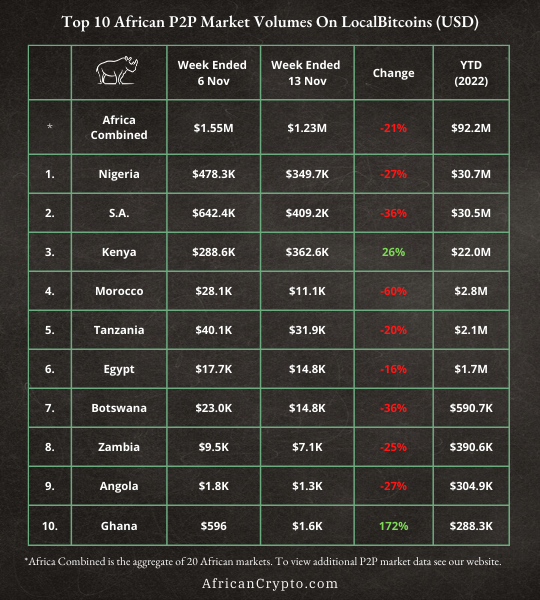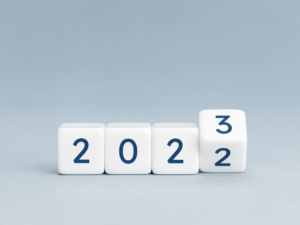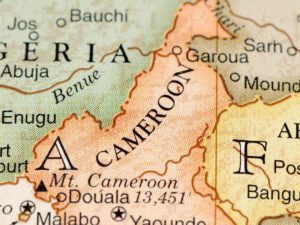Welcome back to the African Crypto Weekly. As the stream of news around FTX continues, we are learning a lot of new information about how the crypto industry is structured globally.
We’ll turn to the emerging African dimensions of the FTX fallout soon, but first, let’s take a look at how different P2P markets on LocalBitcoins responded to last week’s developments.
New to this newsletter? You can subscribe here.


Africa Combined
For the week ended 13 November, Africa Combined volume on LocalBitcoins was $1.23 million, which represented a 21% decline on the previous week’s volume of $1.55 million and marked a new low for 2022. Transactions came in at 4,517 for the week ended 13 November, which represented a 9% decline on the previous week’s count of 4,946 and also marked a new low for 2022. While we saw new lows for both trading volume and transactions, the decline in trading activity wasn’t as sharp as one might expect given the price volatility we saw last week. The previous Africa weekly low for volume in 2022 was $1.27 million in the week ended 16 October; for transactions it was 4,662 in the week ended 23 October.
Nigeria
Nigeria’s volume for the week ended 13 November was $349.7K, which represented a 27% decline on the previous week’s volume of $478.3K and marked a new low for 2022. Transactions came in at 1,253 for the week ended 13 November, which represented an 16% decline on the previous week’s count of 1,496 and also marked a new low for 2022.
South Africa
SA’s volume for the week ended 13 November was $409.2K, which represented a 36% decline on the previous week’s volume of $642.4K and marked a new low for 2022. Transactions came in at 988 for the week ended 13 November, which represented a 21% decline on the previous week’s count of 1,252 and also marked a new low for 2022. The gap between Nigeria and SA for the top spot in YTD volume terms now sits at $197.5K as of the week ended 13 November, down from $257.1K in the previous week.
Kenya
Kenya bucked the trend in the Big Three, coming in with a volume of $362.6K for the week ended 13 November, which represented a 26% improvement on the previous week’s volume of $288.6K. The week ended 13 November is only the second time this year on LocalBitcoins that Kenya has posted a higher weekly volume than Nigeria. Transactions came in at 1,656 for the week ended 13 November, which represented a 12% improvement on the previous week’s count of 1,482.

FTX – Nestcoin
Last Friday’s newsletter touched on FTX’s significant presence in Africa and how it was feasible that we would see knock-on effects on the continent. We didn’t have to wait long, as on Monday, Nestcoin – a prominent Web3 project from Nigeria – revealed that a large portion of its funds had been stored on FTX when the exchange filed for bankruptcy.
Additionally, Nestcoin shared that the company would be reducing its headcount in order to reposition the company. The Financial Times later confirmed that Nestcoin held roughly the remaining $4 million out of the $6.45 million it raised earlier this year on FTX.
FTX – AZA Finance
When FTX filed for bankruptcy last Friday, a list of 134 corporate entities from around the world were named as part of FTX Group. To the surprise of those familiar with payments in Africa, the list contained 23 entities belonging to African payments company AZA Finance (formerly BitPesa). AZA Finance CEO, Elizabeth Rossiello, was quick to release a statement that AZA Finance is entirely independent of FTX and that she was “shocked and disappointed” that AZA Finance entities were named as part of the FTX Group.
Rossiello also shared that AZA Finance would be correcting the court filings. We don’t yet have clarity as to how a separate company was mixed up as part of FTX, but recent reports of poor record keeping practices, including incomplete lists of bank accounts and employees, may offer an explanation. In March of this year, FTX and AZA Finance had announced a commercial partnership where FTX would leverage AZA Finance’s infrastructure for payments in Africa.
FTX – Ovex
On Wednesday, Ovex, a leading South African prime broker and market maker for crypto, revealed that it had terminated its relationship with FTX. According to MyBroadband, FTX was able to offer its margin trading products in South Africa by effectively piggy-backing on Ovex’s Financial Service Provider license. Some may recall that Binance stopped offering margin trading services in South Africa in October 2021 due to requests from regulators.
FTX was able to continue with such services because it was appointed as a “juristic representative” of Ovex. MyBroadband reports that Binance was only able to relaunch margin trading in South Africa in September 2022 following a similar arrangement with Fivewest OTC Desk. On the Moneyweb podcast which aired earlier this week, Ovex CEO Jonathan Ovadia shared that FTX owns 8% of Ovex, which Ovex aims to buy back. Ovadia also confirmed that no Ovex customer assets were held on FTX but roughly 5% of Ovex’s company funds were held on FTX when it declared bankruptcy.
Launch – Modus
On Wednesday, Modus, which is described by TechCrunch as a “New York-based venture platform,” announced the launch of Modus Africa, a $75 million VC fund primarily targeting seed-stage AI and blockchain start-ups in sub-Saharan Africa. An eye-catching statistic in Modus’ announcement is the prediction that Africa has the potential to exceed 200 million new blockchain users over the next four years. Earlier this year, Singapore-based crypto payments firm Triple-A estimated that there are currently 53 million crypto users in Africa.
Launch – Ripple
In what would otherwise be the top crypto story on the continent in most weeks, Ripple announced its expansion into Africa on Tuesday. Ripple is partnering with MFS Africa, which is described on its website as a digital network that connects “over 320 million mobile money wallets [in Africa] to enable cross-border payments for remittance companies, financial service providers, and global merchants.”
According to the announcement, MFS Africa will leverage Ripple’s On-Demand Liquidity solution (which uses the XRP cryptocurrency for transfers), to facilitate real-time mobile money payments across borders. MFS Africa CEO, Dare Okoudjou, described the partnership with Ripple as the “first step for our crypto strategy to leverage blockchain technologies to amplify our impact on consumers and businesses on the continent.” Launched in 2012, Ripple belongs to the older generation of crypto companies. It is the company behind the XRP ledger, which has XRP as its native cryptocurrency. As of writing, XRP is the 7th largest cryptocurrency by market capitalisation ($19.3 billion).

Hilary Allen | Beware the proposed US crypto regulation — it may be a Trojan horse (Financial Times)
Will Canny | BofA: Don’t Tarnish Blockchain Technology With Speculative Crypto Trading (Coindesk)
Kodzilla | Kenya’s Data Protection Office to Investigate Public Data Abuse Complaints Against 54% of Digital Lenders (BitKE)

Nairobi, Kenya | Cardano Blockchain Founders Hangout | 23 November, 3pm (Twitter)
Lomé, Togo | Binance Apéro Crypto | 26 November, 5pm (Twitter)
Accra, Ghana | Africa Bitcoin Conference | 5 December (Afrobitcoin)






